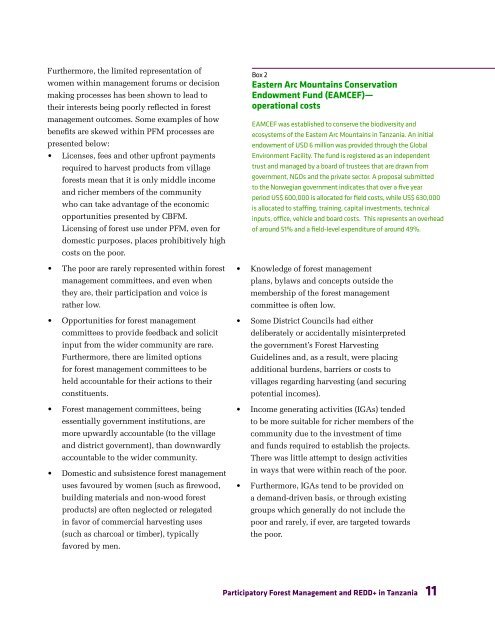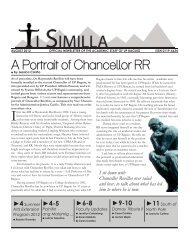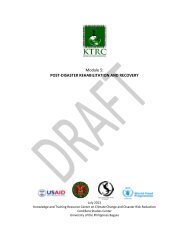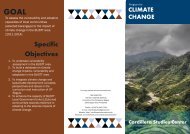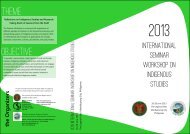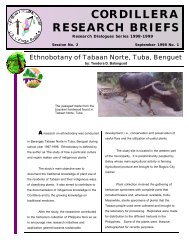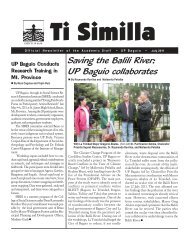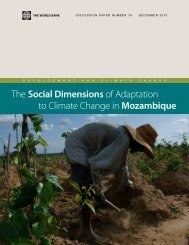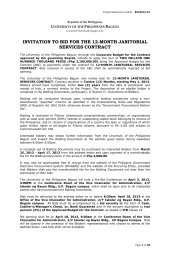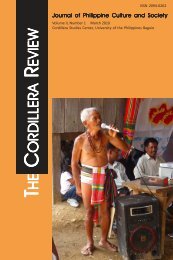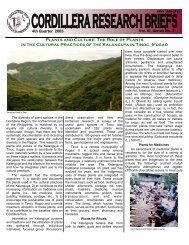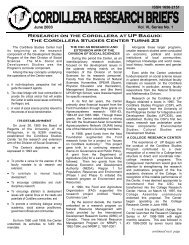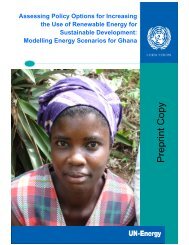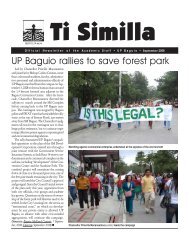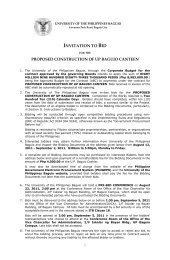Tanzania Report
Tanzania Report
Tanzania Report
You also want an ePaper? Increase the reach of your titles
YUMPU automatically turns print PDFs into web optimized ePapers that Google loves.
Furthermore, the limited representation of<br />
women within management forums or decision<br />
making processes has been shown to lead to<br />
their interests being poorly reflected in forest<br />
management outcomes. Some examples of how<br />
benefits are skewed within PFM processes are<br />
presented below:<br />
• Licenses, fees and other upfront payments<br />
required to harvest products from village<br />
forests mean that it is only middle income<br />
and richer members of the community<br />
who can take advantage of the economic<br />
opportunities presented by CBFM.<br />
Licensing of forest use under PFM, even for<br />
domestic purposes, places prohibitively high<br />
costs on the poor.<br />
Box 2<br />
Eastern Arc Mountains Conservation<br />
Endowment Fund (EAMCEF)––<br />
operational costs<br />
EAMCEF was established to conserve the biodiversity and<br />
ecosystems of the Eastern Arc Mountains in <strong>Tanzania</strong>. An initial<br />
endowment of USD 6 million was provided through the Global<br />
Environment Facility. The fund is registered as an independent<br />
trust and managed by a board of trustees that are drawn from<br />
government, NGOs and the private sector. A proposal submitted<br />
to the Norwegian government indicates that over a ive year<br />
period US$ 600,000 is allocated for ield costs, while US$ 630,000<br />
is allocated to staing, training, capital investments, technical<br />
inputs, oice, vehicle and board costs. This represents an overhead<br />
of around 51% and a ield-level expenditure of around 49%.<br />
•<br />
The poor are rarely represented within forest<br />
•<br />
Knowledge of forest management<br />
management committees, and even when<br />
plans, bylaws and concepts outside the<br />
they are, their participation and voice is<br />
membership of the forest management<br />
rather low.<br />
committee is often low.<br />
•<br />
Opportunities for forest management<br />
•<br />
Some District Councils had either<br />
committees to provide feedback and solicit<br />
deliberately or accidentally misinterpreted<br />
input from the wider community are rare.<br />
the government’s Forest Harvesting<br />
Furthermore, there are limited options<br />
Guidelines and, as a result, were placing<br />
for forest management committees to be<br />
additional burdens, barriers or costs to<br />
held accountable for their actions to their<br />
villages regarding harvesting (and securing<br />
constituents.<br />
potential incomes).<br />
•<br />
Forest management committees, being<br />
•<br />
Income generating activities (IGAs) tended<br />
essentially government institutions, are<br />
to be more suitable for richer members of the<br />
more upwardly accountable (to the village<br />
community due to the investment of time<br />
and district government), than downwardly<br />
and funds required to establish the projects.<br />
accountable to the wider community.<br />
There was little attempt to design activities<br />
•<br />
Domestic and subsistence forest management<br />
in ways that were within reach of the poor.<br />
uses favoured by women (such as firewood,<br />
•<br />
Furthermore, IGAs tend to be provided on<br />
building materials and non-wood forest<br />
a demand-driven basis, or through existing<br />
products) are often neglected or relegated<br />
groups which generally do not include the<br />
in favor of commercial harvesting uses<br />
poor and rarely, if ever, are targeted towards<br />
(such as charcoal or timber), typically<br />
the poor.<br />
favored by men.<br />
Participatory Forest Management and REDD+ in <strong>Tanzania</strong><br />
11


